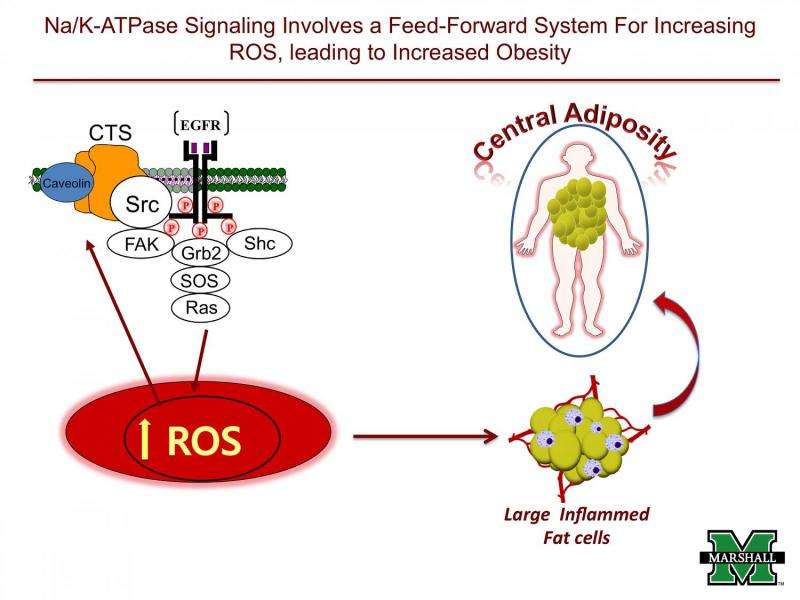Team finds that targeting sodium-potassium pump in fat cells may help reduce obesity

Researchers with the Marshall University Joan C. Edwards School of Medicine (SOM) and the Marshall University Institute for Interdisciplinary Research (MIIR) have identified a mechanism for blocking the signal by which the cellular sodium-potassium pump amplifies oxidants (reactive oxygen species). These oxidants lead to obesity and metabolic syndrome.
Their research was published this week in the journal, Science Advances.
Joseph I. Shapiro, M.D., dean of the school of medicine and the study's senior author, says the study is a true collaborative effort.
"I am extremely proud of this work, as the studies were conceived of, performed and analyzed entirely at Marshall University," Shapiro said. "This work was based on two important components. We employed a peptide, pNaKtide, which was derived from the novel hypothesis developed by Marshall's MIIR director, Dr. Zijian Xie. Specifically, Dr. Xie has shown that, in addition to its well-described role as an ion transporter, the sodium pump also regulates signal transduction and oxidant amplification. We also exploited work from Marshall's SOM vice-dean for research, Dr. Nader Abraham, who has demonstrated a key role for oxidant stress in adipocytes in the development of obesity. The studies, which address a critical problem in the Appalachian population we serve, were performed entirely by our research staff at Marshall University."
First author Komal Sodhi, M.D., assistant professor of surgery and pharmacology at Marshall, says the research examined a peptide (pNaKtide) designed to block the sodium potassium Na/K-ATPase signaling cascade, which altered the phenotype of adipocytes (fat cells) in a cell culture system.
"We found this decreased the development of obesity and metabolic syndrome in mice subjected to a high-fat diet," Sodhi said. "The studies performed strongly supported this idea and suggest that if this is confirmed in humans, the Na/K-ATPase might ultimately be a therapeutic target for clinical conditions like obesity and metabolic syndrome, which are particularly relevant to West Virginia where more than one-third of the population is currently obese."
Shapiro said while there are years of work ahead for researchers to determine the impact on humans, they believe they have hit on a feasible strategy for treating obesity and metabolic syndrome.

"The bottom line is that we've identified a novel mechanism by which to address oxidant stress and, through this mechanism, treat obesity," Shapiro said. "Our work opens up a new target for intervention in this disease as well as possibly other diseases characterized by oxidant stress."
In addition to Shapiro and Sodhi, Marshall's team of researchers includes Kyle Maxwell; Yanling Yan, Ph.D.; Jiang Liu, M.D., Ph.D.; Muhammad A. Chaudhry, M.A.; Morghan Getty; Zijian Xie, Ph.D.; and Nader G. Abraham, Ph.D.
More information: pNaKtide inhibits Na/K-ATPase reactive oxygen species amplification and attenuates adipogenesis, Science Advances, advances.sciencemag.org/content/1/9/e1500781



















